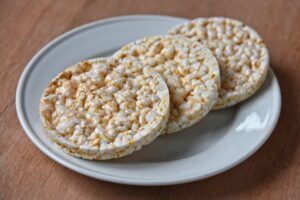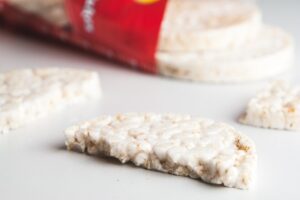Rice cakes are generally a healthy snack, particularly when combined with avocado, fruit, or peanut butter.
Due to their low calorie and carbohydrate content, rice cakes are a popular snack, especially among those attempting to maintain a healthy weight. Why? Because a rice cake is formed from puffed rice compressed into a patty.
However, are these crisp snacks healthy? Here is an overview of the nutritional value, benefits, and drawbacks of rice cakes, as well as healthy ways to consume them.
Dietary Values of Rice Cake
The nutrient content of rice cakes varies depending on their type. For instance, rice cakes are available in a variety of flavors, including chocolate, white cheddar, apple cinnamon, and caramel corn. These flavors include additives that increase their sugar or sodium content.
Still, brown rice cakes made with whole grains and without additives can be found in many grocery stores.

The following nutrients are listed by the Department of Agriculture for one small, plain brown rice cake (approximately nine grams):
- Calories: 34.8
- Sodium: 2.3 mg
- Fat: 0.3 grams (g)
- Protein: 0.7 g
- Carbohydrates: 7.3 g
- Sugar: 0 g
- Fiber: 0.4 g
- Manganese: 17% daily value (DV)
- Niacin: 4% DV
- Magnesium: 3% DV
- Zinc: 2% DV
Manganese is one of the most prominent nutrients in rice cakes. Manganese is an essential mineral for immune function, collagen production, and bone health.
Niacin, a B vitamin, is present in small quantities in rice cakes. Niacin aids in the conversion of food into fuel for the body.
Additionally, rice cakes contain trace quantities of magnesium and zinc.
Because portion sizes vary, it is essential to check the nutrition facts label of the rice cake brand you buy. One lightly salted brown rice cake may weigh approximately 18.5 grams. And its nutritional value is comparable to that of a typical slice of bread.
Possible Health Advantages of Rice Cakes
Due to the variation in composition and size of rice cakes, the best response to the question of whether they are healthy is: It depends.
Avoid flavored rice cake that contains excessive amounts of sugar, sodium, and other artificial ingredients.
Additionally, you should avoid those made with white rice. Refined grain white rice is devoid of fiber, vitamins, minerals, and antioxidants.
In contrast, plain rice cakes, which are made from puffed brown rice, have some health benefits.
Antioxidants
Antioxidants are food-based compounds that protect healthy cells from free radical damage. Free radicals are harmful substances that accelerate aging and may increase the risk of developing chronic diseases.
Brown rice contains phenolic compounds, a class of antioxidants also found in tea and citrus fruits, according to a 2018 review published in the journal Antioxidants.
Phenolic compounds protect cells against damage associated with an increased risk of type 2 diabetes, obesity, cancer, and cardiovascular disease.

Blood Sugar Control
A study published in the journal Diabetes Care in 2020 suggests that whole grains such as brown rice may help diabetics control their post-meal blood sugar levels.
Whole grains may prevent type 2 diabetes.
What’s the reason? Whole grains are rich in dietary fiber. The body is incapable of digesting and absorbing fiber for energy.
Therefore, fiber does not cause a blood sugar spike like refined carbohydrates.
In addition, the fiber found in whole grains feeds the beneficial bacteria in our gut, such as Lactobacillus and Bifidobacterium. Some beneficial bacteria have been linked to the prevention of diabetes and obesity.
Weight Management
Rice cake can help you maintain a healthy weight if you substitute them for foods that are high in calories and carbohydrates.
By substituting one plain bagel for two organic brown rice cakes, for instance, one can save 130 calories and 21 grams of carbohydrates. Switching three times per week could result in a weight loss of nearly six pounds per year.
Easy To Digest
As a low-FODMAP food, rice, including plain brown rice cake, is easy to digest. FODMAP is an acronym for the sugars fermentable oligosaccharides, disaccharides, monosaccharides, and polyols.
FODMAPs are poorly absorbed by the body during digestion. And for some individuals, FODMAPS can cause bloating, pain, cramps, and gas, according to a 2017 study published in the journal Nutrients.
Moreover, because brown rice is naturally gluten-free, plain brown rice cake is an excellent option for individuals who cannot consume gluten.
Ideas for Rice Cake Snacks
Plain brown rice cakes, such as the Lundberg brand, are available at major supermarkets. Plain brown rice cakes are typically healthier than rice cakes with added flavors.
Plain brown rice cake lacks a distinctive flavor. However, you may detect a slightly nutty flavor that pairs well with both savory and sweet accompaniments, such as:
- Avocado purée topped with sprouted pumpkin seeds
- Hummus is topped with vegetables such as baby spinach, tomato slices, and cucumber.
- Olive tapenade
- Vegan pesto
- Nut-based cheese, such as vegan ricotta, topped with pepper, tomato slices, and basil.
- Chocolate hummus with sliced berries on top.
- Almond or cashew butter with banana slices and cinnamon on top.
- Dark chocolate melted with pomegranate arils or fig slices.
- Peanut butter or sunflower seed butter with raspberry jam.
- Coconut butter topped with chopped walnuts and cocoa nibs.

Overview
Then, are rice cakes nutritious? Well, it depends. Rice cakes are available in numerous varieties at your local grocery store. And many of them contain added sugars and high carbohydrate content.
However, if you choose a plain brown rice cake, there may be health benefits. These rice cakes are easy to digest, contain antioxidants that protect against free radical damage, and regulate blood sugar. In addition to aiding in weight management, plain brown rice cakes are gluten-free and make delicious snacks.
- Do you believe that rice cakes alone can provide sufficient nutrition?
If you enjoyed this blog post, share it with your friends!
